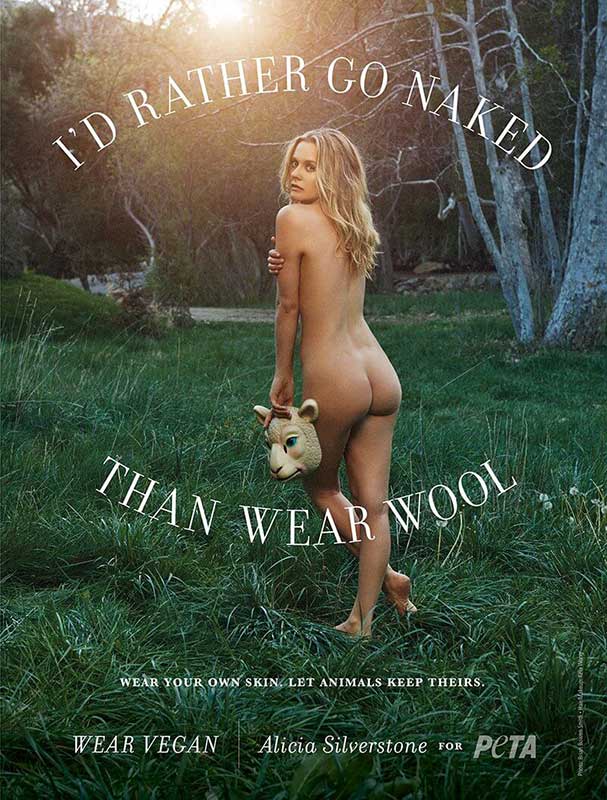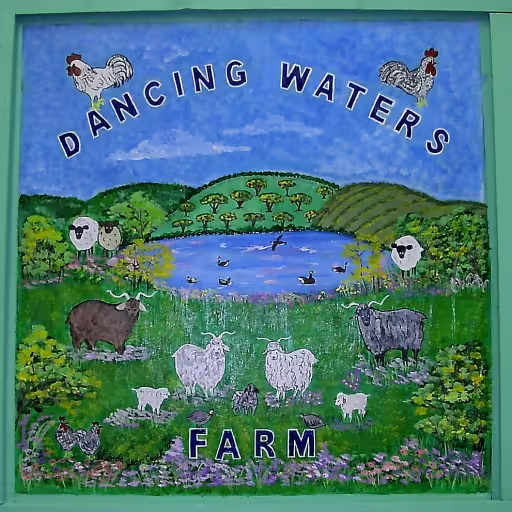Not I….as an animal lover and long time sheep and goat owner I can say with confidence that fiber animals need to be shorn for their health and it does not have to be a frightening experience. They don’t like having their feet trimmed either but if left untrimmed they would go lame. Nature is far more cruel than a caring owner, and every second of life is not completely idyllic for any of us.
*****************************************************************************************
If Alicia Silverstone was naked and telling you all wool clothing was bad, would you believe her?

PETA, the animal rights organization, has a reputation for employing the oldest marketing trick in the book: selling their message with sex.
The latest example? Their campaign to raise awareness of animal abuse in the wool industry, which features a poster of Alicia Silverstone walking naked into a meadow, her head turned over her shoulder, looking back at you with seductive, pleading eyes. The caption reads, “I’d rather go naked than wear wool.”
Pamela Anderson, the singer Pink, and a handful of other celebrities have also bared all for the cause.
The PETA creed is that “animals are not ours to eat, wear, experiment on, use for entertainment, or abuse in any other way.” In other words, keeping livestock for purposes of human consumption, whether in a factory-farming setting or a small organic farm, is ethically reprehensible. PETA is well known for popularizing veganism and exposing animal rights abuses around the world. But livestock farmers, unsurprisingly, have long despised their shock and awe tactics, which have a tendency to paint all farmers as evil animal abusers.
PETA’s current sheep campaign—typically broadcast with the tagline, “there is no such thing as humane wool”—was launched in 2014 after the organization released footage of sheep being cut, manhandled, and mangled at wool-shearing operations in the US and Australia. The effort got major press coverage around the world, and led to the prosecution of several of the Australian shearers who were depicted in the footage on animal abuse charges. Now that Alicia Silverstone has put her skin in the game (pun intended), PETA’s wool campaign is back in the media once again.
Wool producers, along with a number of large agriculture organizations, have fought back. In Australia, the Victoria Farming Federation filed a formal complaint when a locally popular vegan musician was featured in PETA ads holding a bloodied lamb carcass with the caption, “here’s the rest of your wool coat.” It turned out the carcass was made of Styrofoam. PETA admitted to using a prop, but maintains that it was a realistic illustration of the horrors of shearing.
A skilled shearer needs just two minutes per sheep, and at worst, leaves a scrape or two no more gory than minor shaving cut. As far as viewing the sheep’s resistance to the practice as an indicator of cruelty, she suggests one might consider the challenges of bathing an uncooperative child or dog.
Animal abuse is far too common an occurrence with pets kept by demented individuals everywhere. And as PETA’s undercover sheep investigation clearly shows, along with many others that have preceded it, some abusive individuals (unfortunately) make their living handling livestock on farms throughout the world. The question is, is abuse the norm? Are examples of abuse at a few sheep ranches enough to indict an entire industry?
We thought it would be worth asking a wool producer who claims to raise their sheep in a sustainable, humane manner how their practices differ from what PETA ascribes to all wool producers. Becky Weed, owner of Thirteen Mile Lamb & Wool Company in southwestern Montana, was a little reluctant to take the call from Modern Farmer, as she’s been caught in the crosshairs of the animal cruelty debate before and has better things to do than argue with activists about whether or not raising sheep is inherently evil.
“I am wary of PETA,” says Weed, right off the bat. “I don’t think it’s a particularly rational organization…I think animal welfare is important, but I don’t believe that raising sheep is by definition cruel.”
Her harsh words stem from PETA’s unwillingness to acknowledge the many farmers who make humane animal care a top priority, throwing animal-loving ranchers like Weed under the bus as they expose the horrors of the industrial livestock industry.
Weed, who also operates an artisanal-scale solar-powered wool processing facility on her property, says she would like to think that PETA would see folks like her as an ally. Her farm is certified organic, she goes above and beyond the most stringent animal welfare standards, and her sheep have free range on pristine Montana prairie. With 160 acres for her 100 or so ewes, Weed’s sheep are stocked at an extremely low density that’s good for the animals and good for the land. She says PETA would have the support of a lot more farmers if they didn’t paint them all the same way.
“There are things that happen in industrial farming that are outrageously indefensible,” says Weed. “Like cramming poultry in tiny cages, putting cattle in feedlots where they are standing in their own manure up to their knees, and feeding ruminants a diet heavy in grains when they have evolved to live on grass. I’m the last person who will defend them. But practices like shearing sheep just pale by comparison. I wish they would focus their efforts where the really serious problems are.”
PETA is correct, says Weed, in noting that sheep often resist being shorn and must be restrained. It’s also true that minor cuts and nicks are part and parcel to shearing, though Weed says the savage shearing shown in the PETA videos, where some sheep appear to have massive wounds with loose, bloodied flaps of skins visible, are signs of either a demented, or untrained and extremely careless, shearer.
A skilled shearer, she says, needs just two minutes per sheep, and at worst, leaves a scrape or two no more gory than minor shaving cut. As far as viewing the sheep’s resistance to the practice as an indicator of cruelty, she suggests one might consider the challenges of bathing an uncooperative child or dog. They don’t love it, but it’s one of those necessary inconveniences.
Wild sheep naturally shed their thick winter coat in spring, but domesticated sheep have been bred over millennia to have an unnaturally thick coat, which, as we’ve reported before, never stops growing. Older sheep become accustomed to the routine and put up little or no resistance. Perhaps they realize it’s for the best: after several years without shearing, the wool becomes suffocatingly hot and can restrict the sheep’s movement.
Excess wool also predisposes sheep to infections and parasites, which is why the American Society of Animal Science responded to PETA’s sheep campaign with one of their own. The tagline read: “There is no such thing as humane wool when it is left on the sheep.”
Weed says “our sheep act super happy and animated after they get shorn…they seem happy to get rid of their wool. Occasionally there may be some cuts, but I’d wager I cut and bruise and bleed more often myself working on the ranch than my sheep do when they’re shorn. I think it’s one of the least cruel things that happens to animals in agriculture.”
We invited PETA to respond to Weed’s assertion that shearing, when done right, is benign. We also inquired whether they agreed that there is typically a big difference in the treatment of animals at industrial livestock operations versus small-scale producers. We sent them a series of questions to this effect to which they replied only with the following statement:
“Sheep are prey animals, so unless they’re left alone, they’re terrified. The size of the farm doesn’t matter. Even on small farms, they’re often herded with vehicles or dogs, forced into a shearing shed, and pinned down and sheared. Even the most careful shearer often cuts these struggling, panicked, and stressed animals. The only way to ensure that no sheep has suffered for our clothing is to shop vegan.”
Becky Weed would certainly contend that there are indeed humane sources of wool clothing available. She’s one of 44 humane wool producers in North America certified by Animal Welfare Approved. And there is a new wool-specific welfare certification on the humane livestock scene, which is called the Responsible Wool Standard. They just certified their first producers this year: two in Australia, one in Uruguay, and one in Oregon.
Pushed by major clothing brands, such as Patagonia, Eileen Fisher and H & M, RWS is geared for the large-scale producers that supply the vast majority of the world’s wool supply, and came about in part due to the negative publicity generated by the PETA exposé.
So even if the group’s point of view is a little, shall we say, un-nuanced, perhaps PETA is still giving a needed boost to the ethical livestock movement anyways by helping to convince the world’s largest livestock operations that consumers actually do expect them to provide the same level of care for their animals as is often found on the smallest of family farms.
Source: https://modernfarmer.com/2017/01/alicia-silverstone-naked-telling-wool-clothing-bad-believe/
